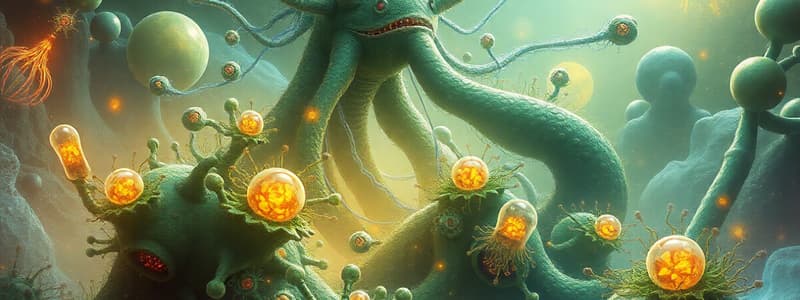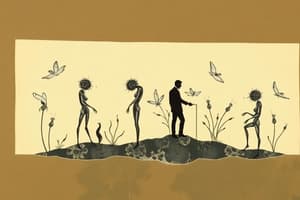Podcast
Questions and Answers
Which of the following is NOT a subfield of microbiology?
Which of the following is NOT a subfield of microbiology?
- Astrobiology (correct)
- Virology
- Bacteriology
- Mycology
What is the main conclusion of Francisco Redi's experiment?
What is the main conclusion of Francisco Redi's experiment?
- Life can originate from sterile environments.
- Microorganisms can grow in sealed containers.
- Decay is a result of chemical reactions.
- Decaying meat does not spontaneously generate life. (correct)
Which statement best describes the germ theory of disease?
Which statement best describes the germ theory of disease?
- Diseases are solely the result of environmental factors.
- All microbes are harmful and cause diseases.
- Microbial infections can lead to diseases. (correct)
- All diseases are caused by genetic defects.
What significant finding did Joseph Lister contribute to medical practices?
What significant finding did Joseph Lister contribute to medical practices?
How did John Snow trace the cholera outbreak in 1848?
How did John Snow trace the cholera outbreak in 1848?
What does the cell theory state about the origin of cells?
What does the cell theory state about the origin of cells?
Which of the following is NOT one of Koch's postulates?
Which of the following is NOT one of Koch's postulates?
Which factor is a common exception to Koch's postulates?
Which factor is a common exception to Koch's postulates?
Which of the following accurately summarizes Florence Nightingale's contribution to epidemiology?
Which of the following accurately summarizes Florence Nightingale's contribution to epidemiology?
What aspect of the modern germ theory focuses on understanding diseases?
What aspect of the modern germ theory focuses on understanding diseases?
Flashcards are hidden until you start studying
Study Notes
Subfields of Microbiology
- Bacteriology: Study of bacteria.
- Mycology: Study of fungi.
- Protozoology: Study of protozoa.
- Parasitology: Study of helminths and other parasites.
- Virology: Study of viruses.
- Immunology: Study of the immune system.
Abiogenesis and Experiments
- Abiogenesis: Theory that life can spontaneously arise from non-living matter.
- Francisco Redi's Experiment: Showed that decaying meat did not produce maggots, indicating that flies (not spontaneous generation) were the source of the larvae.
- Louis Pasteur's Experiment: Demonstrated that sterile broth remains free of microorganisms unless exposed to air, disproving abiogenesis.
Cell Theory
- Cell Theory: States that all cells arise from pre-existing cells.
Robert Hooke's Discovery
- Hooke's Observation: Identified and named "cells" when observing cork through a microscope.
Germ Theory
- Germ Theory: Proposes that diseases may be caused by microbial infections.
Ignaz Semmelweis
- Semmelweis's Key Finding: Advocated for handwashing with lime solutions to significantly lower mortality rates during childbirth.
John Snow's Cholera Investigation
- Cholera Outbreak Investigation: Mapped cholera cases to identify a contaminated water pump as the source of the outbreak in 1848.
Joseph Lister's Surgical Advancements
- Lister's Solution: Introduced carbolic acid for sanitizing surgical wounds to prevent postoperative infections.
Florence Nightingale's Contributions
- Nightingale's Epidemiological Work: Used statistical analysis to highlight preventable causes of death related to infections, sanitation, and hygiene.
Koch's Postulates
- Koch’s First Postulate: The microbe must be found in all diseased individuals.
- Koch’s Second Postulate: The microbe must be cultured outside the host.
- Koch’s Third Postulate: The cultured microbe must cause disease when introduced to a healthy host.
- Koch’s Fourth Postulate: The microbe must be re-isolated from the diseased host.
Exceptions to Koch's Postulates
- Isolation Challenges: Some microbes cannot be cultured outside their natural host.
- Multiple Disease Causes: Some pathogens are capable of causing multiple diseases.
- Host Specificity: Some pathogens may only cause disease in specific hosts.
Modern Focus of Germ Theory
- Antibody Resistance: Researching how pathogens resist immune responses.
- Emerging Diseases: Investigating new diseases and those caused by multiple organisms.
- Mechanisms of Pathogenesis: Understanding the mechanisms by which microbial agents cause disease.
Studying That Suits You
Use AI to generate personalized quizzes and flashcards to suit your learning preferences.




